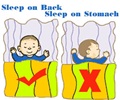More than half of sudden infant deaths reviewed in a study released Wednesday occurred while the babies shared a bed or sofa with a parent.
More than half of sudden infant deaths reviewed in a study released Wednesday occurred while the babies shared a bed or sofa with a parent.
The incidence of so-called sudden infant death syndrome, or SIDS, increased when the adult "co-sleeping" with the infant had recently consumed alcohol or drugs, the study found.SIDS entered the medical vocabulary some 40 years ago to describe cases in which babies, mainly two to six months old, died for reasons that defied explanation.
Since then, research has identified several SIDS risk factors related to behaviour.
Sleeping on the tummy rather than on the back, for example, was far more likely to lead to an otherwise unexplained deaths. Soft objects such as pillows in a baby's crib, along with mothers who smoke, were also associated with a higher number of deaths.
Public awareness campaigns in many developed countries have cut death rates by more than half - from about 1-in-800 live births to less than 1-in-2,000 - over the last two decades.
But questions remained about how to account for this dwindling number of cases, and whether they occur more frequently in some sectors of society than others.
They compared them with two other control groups, one with 82 "high risk" infants of smoking, socially-deprived, single mothers with two or more kids, and the other with 87 babies from randomly selected families.
"Much of this excess may be explained by a significant... interaction between co-sleeping at recent parental use of alcohol or drugs," the researchers said.
In the two control groups, the rate of co-sleeping was about 20 percent.
The study, published in the British Medical Journal, also noted that one fourth of the infants who died were swaddled, and one fifth used a pillow, a far higher percentage than in either control group.
Socioeconomic deprivation did not seem to be a factor.
"The dangers of this combination of behaviours are, for the first time, convincingly shown in this study," Edwin Mitchell, a professor at the University of Auckland in New Zealand, noted in a commentary, also in the BMJ.
"We have learnt that SIDS is largely preventable," he continued, calling for better parental education.
Source-AFP
SRM
 MEDINDIA
MEDINDIA



 Email
Email




